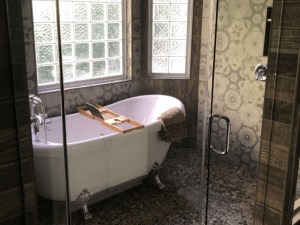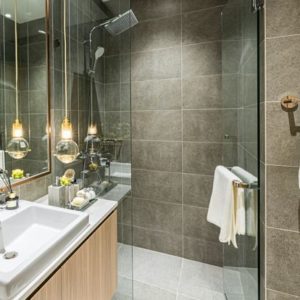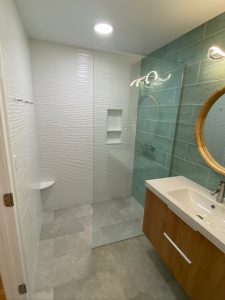For centuries, floors, walls, roofs, and other surfaces that require waterproofing or aesthetic appeal have been covered with tiles, which are also long-lasting and elegant materials. Tiles have been existing for a very long time and have been preserved in prehistoric artifacts dating back thousands of years.
When it comes to flooring options, tile shower floors are trusted and durable. You may be wondering what kind of tile is the most durable for a shower remodel. Likely, you’re also curious about how long do tile showers last before another renovation or floor replacement needs to be done.
How Long Do Tile Showers Last?
Tile showers can last 40 to 80 years if installed properly and cleaned regularly. Materials like ceramic and porcelain tile are strong and built to last. In comparison, fiberglass or acrylic showers usually only last 10 to 15 years.
If you want your shower to stay in good shape for a long time, tile is a smart choice. Picking simple colors like white or gray tile also helps your shower look modern, even as styles change. A well-maintained tile shower adds value to your home and doesn’t need to be replaced often.
What affects the lifespan of a tile shower?
The lifespan of a tile shower depends on how well it’s taken care of. One big factor is grout maintenance. Grout fills the gaps between your shower tiles and keeps water out. If the grout cracks or wears away, water can seep behind the tiles and cause damage. Cleaning your grout regularly and resealing it every few years helps your tile shower last longer.
The type of tile also matters. Porcelain tile showers last longer than ceramic because they’re harder and more water-resistant. Natural stone tile showers look great but need more care and sealing. Another key part is waterproofing and underlayment, which are layers under the tile that stop water from leaking into the walls or floor. If these parts are done right during installation, your tile shower will stay strong for many years.
Here are 4 tile shower types and how long they last:
Fiberglass And Acrylic Tiles
Showers using fiberglass and acrylic tiles are typically the least priced and simplest to install. These prefabricated tile showers are often constructed from a single, solid piece of material that has been shaped; this solid design helps to ensure that the tiles won’t leak.
Although fiberglass tile showers are usually the least expensive alternative, they also don’t last very long. These showers have the downside of being readily broken or splintered. This tile shower might be able to be fixed and sealed if the damage is not too severe. When that happens, it will need to be often resealed to prevent leaks. Consequently, if the tile shower is damaged, it is always advised to replace it.
Simple installation and replacement are two of the primary advantages of fiberglass and acrylic tile showers. It is typically possible to finish the removal of the old tile shower and installation of the new one in a single day.
Glass Tiles
Glass tiles are a sophisticated option for a modern shower. Their popularity seems to be rising drastically. The shower area appears larger and more spacious because it has a reflected surface formed by the glass.
Glass tiles can easily outlast the shower pan liner with regular cleaning. They can, however, readily break or split because they also happen to be rather fragile. Glass tiles also have a downside which is readily scratched. The fact that glass tiles are significantly harder to clean off soap residue and limescale just makes this problem worse. Glass tiles require annual resealing and regrouting every 5 to 10 years to maintain their condition.
Porcelain And Ceramic Tiles
Popular choices that can improve the aesthetics of your shower and the entire shower are porcelain and ceramic tile finishes. Having so much creative control over the design, look, and dimensions of your shower is one of the main benefits of utilizing tiles.
The fact that tiles are easy to repair is yet another great advantage when you utilize them. You don’t need to replace the shower entirely if any of the tiles break or fracture; you may just replace the broken tiles.
The typical lifespan of a tile shower is 40 to 50 years, plus additional maintenance such as grouting and sealing required every few years. Although they might theoretically last much longer, the problem is that shower pan liners often have an average lifespan of 45 years or less. After that, the pan liner frequently starts to get tiny holes or breaks that let water seep out. There is a widespread misperception that a shower’s grout and tiles are what keep it from leaking. What keeps the shower from leaking is the pan liner.
Stone Tiles
Without a doubt, stone tiles are stunning and excellent when it comes to appearances. They don’t, however, always produce the ideal shower material. Stone tiles may last for decades, easily lasting just as long or longer than the pan liner, similar to porcelain and ceramic tiles. The primary problem with stone tiles is their high porosity, which requires frequent and intensive cleaning. If you live in a place with hard water, this issue gets worse because all of the minerals may stick to the stone and penetrate all of the pores, making it practically hard to maintain a clean shower.
Slate, marble, or granite are used to make stone tiles. Because of their porous nature, they are costly and require a lot of maintenance, but they give your shower a natural, organic feel. Compared to non-wet parts of the house like the driveway, shower tiles require more maintenance. Stone might easily require restorations due to its absorption of water and soap.
Conclusion
Tiles should typically last at least 20 years before becoming worn out. You can choose the ideal tile for your showers by being aware of how long do tile showers last. Ultimately, it comes down to personal preference for the material and desired aesthetic.
Regular cleaning, whether done by you or by a professional service, extends the life of your shower’s tiles. Choosing high-quality tiles for installation also helps to guarantee long-lasting shower tiles. It’s important to install the tiles correctly to ensure that they last, so you might want to hire a professional to do it for you.
Frequently Asked Questions
1. How long does a tile shower last?
A properly installed and maintained tile shower can last 40 to 80 years, depending on the material. Porcelain and stone tiles usually last the longest, while fiberglass or acrylic showers last around 10–15 years.
2. How often should I maintain grout and reseal my tile shower?
Grout should be cleaned regularly and resealed every 2–5 years, depending on the tile type. This prevents water damage and extends your shower’s life.
3. Which type of tile is best for long-lasting showers?
Porcelain and ceramic tiles are durable and low-maintenance. Natural stone tiles look luxurious but require more frequent sealing. Fiberglass and acrylic showers are the least durable.






